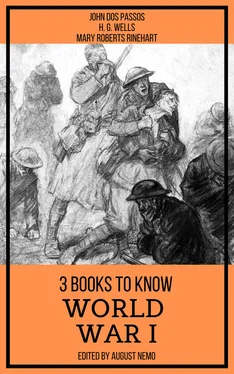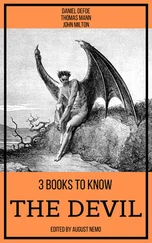They heard the steps come nearer, wander about irresolutely and then go off in the direction from which they had come.
Meanwhile the throb of motors overhead grew louder and louder.
“Well?” came the officer's voice.
“Couldn't find them, sir,” mumbled the other voice.
“Nonsense. Those men were drunk,” came the officer's voice.
“Yes, sir,” came the other voice humbly.
Chrisfield started to giggle. He felt he must yell aloud with laughter.
The nearest motor stopped its singsong roar, making the night seem deathly silent.
Andrews jumped to his feet.
The air was split by a shriek followed by a racking snorting explosion. They saw the wall above their pit light up with a red momentary glare.
Chrisfield got to his feet, expecting to see flaming ruins. The village street was the same as ever. There was a little light from the glow the moon, still under the horizon, gave to the sky. A window in the house opposite showed yellow. In it was a blue silhouette of an officer's cap and uniform.
A little group stood in the street below.
“What was that?” the form in the window was shouting in a peremptory voice.
“German aeroplane just dropped a bomb, Major,” came a breathless voice in reply.
“Why the devil don't he close that window?” a voice was muttering all the while. “Juss a target for 'em to aim at... a target to aim at.”
“Any damage done?” asked the major.
Through the silence the snoring of the motors sing-songed ominously overhead, like giant mosquitoes.
“I seem to hear more,” said the major, in his drawling voice.
“O yes sir, yes sir, lots,” answered an eager voice.
“For God's sake tell him to close the window, Lieutenant,” muttered another voice.
“How the hell can I tell him? You tell him.”
“We'll all be killed, that's all there is about it.”
“There are no shelters or dugouts,” drawled the major from the window. “That's Headquarters' fault.”
“There's the cellar!” cried the eager voice, again.
“Oh,” said the major.
Three snorting explosions in quick succession drowned everything in a red glare. The street was suddenly filled with a scuttle of villagers running to shelter.
“Say, Andy, they may have a roll call,” said Chrisfield.
“We'd better cut for home across country,” said Andrews.
They climbed cautiously out of their manure pit. Chrisfield was surprised to find that he was trembling. His hands were cold.
It was with difficulty he kept his teeth from chattering.
“God, we'll stink for a week.”
“Let's git out,” muttered Chrisfield, “o' this goddam village.”
They ran out through an orchard, broke through a hedge and climbed up the hill across the open fields.
Down the main road an anti-aircraft gun had started barking and the sky sparkled with exploding shrapnel. The “put, put, put” of a machine gun had begun somewhere. Chrisfield strode up the hill in step with his friend. Behind them bomb followed bomb, and above them the air seemed full of exploding shrapnel and droning planes. The cognac still throbbed a little in their blood. They stumbled against each other now and then as they walked. From the top of the hill they turned and looked back. Chrisfield felt a tremendous elation thumping stronger than the cognac through his veins. Unconsciously he put his arm round his friend's shoulders. They seemed the only live things in a reeling world.
Below in the valley a house was burning brightly. From all directions came the yelp of anti-aircraft guns, and overhead unperturbed continued the leisurely singsong of the motors.
Suddenly Chrisfield burst out laughing. “By God, Ah always have fun when Ah'm out with you, Andy,” he said.
They turned and hurried down the other slope of the hill towards the farms where they were quartered.
––––––––
AS FAR AS HE COULD see in every direction were the grey trunks of beeches bright green with moss on one side. The ground was thick with last year's leaves that rustled maddeningly with every step. In front of him his eyes followed other patches of olive-drab moving among the tree trunks. Overhead, through the mottled light and dark green of the leaves he could see now and then a patch of heavy grey sky, greyer than the silvery trunks that moved about him in every direction as he walked. He strained his eyes down each alley until they were dazzled by the reiteration of mottled grey and green. Now and then the rustling stopped ahead of him, and the olive-drab patches were still. Then, above the clamour of the blood in his ears, he could hear batteries “pong, pong, pong” in the distance, and the woods ringing with a sound like hail as a heavy shell hurtled above the tree tops to end in a dull rumble miles away.
Chrisfield was soaked with sweat, but he could not feel his arms or legs. Every sense was concentrated in eyes and ears, and in the consciousness of his gun. Time and again he pictured himself taking sight at something grey that moved, and firing. His forefinger itched to press the trigger. He would take aim very carefully, he told himself; he pictured a dab of grey starting up from behind a grey tree trunk, and the sharp detonation of his rifle, and the dab of grey rolling among the last year's leaves.
A branch carried his helmet off his head so that it rolled at his feet and bounced with a faint metallic sound against the root of a tree.
He was blinded by the sudden terror that seized him. His heart seemed to roll from side to side in his chest. He stood stiff, as if paralyzed for a moment before he could stoop and pick the helmet up. There was a curious taste of blood in his mouth.
“Ah'll pay 'em fer that,” he muttered between clenched teeth.
His fingers were still trembling when he stooped to pick up the helmet, which he put on again very carefully, fastening it with the strap under his chin. Furious anger had taken hold of him. The olive-drab patches ahead had moved forward again. He followed, looking eagerly to the right and the left, praying he might see something. In every direction were the silvery trunk of the beeches, each with a vivid green streak on one side. With every step the last year's russet leaves rustled underfoot, maddeningly loud.
Almost out of sight among the moving tree trunks was a log. It was not a log; it was a bunch of grey-green cloth. Without thinking Chrisfield strode towards it. The silver trunks of the beeches circled about him, waving jagged arms. It was a German lying full length among the leaves.
Chrisfield was furiously happy in the angry pumping of blood through his veins.
He could see the buttons on the back of the long coat of the German, and the red band on his cap.
He kicked the German. He could feel the ribs against his toes through the leather of his boot. He kicked again and again with all his might. The German rolled over heavily. He had no face. Chrisfield felt the hatred suddenly ebb out of him. Where the face had been was a spongy mass of purple and yellow and red, half of which stuck to the russet leaves when the body rolled over. Large flies with bright shiny green bodies circled about it. In a brown clay-grimed hand was a revolver.
Chrisfield felt his spine go cold; the German had shot himself.
He ran off suddenly, breathlessly, to join the rest of the reconnoitering squad. The silent beeches whirled about him, waving gnarled boughs above his head. The German had shot himself. That was why he had no face.
Chrisfield fell into line behind the other men. The corporal waited for him.
“See anything?” he asked.
“Not a goddam thing,” muttered Chrisfield almost inaudibly. The corporal went off to the head of the line. Chrisfield was alone again. The leaves rustled maddeningly loud underfoot.
Читать дальше












